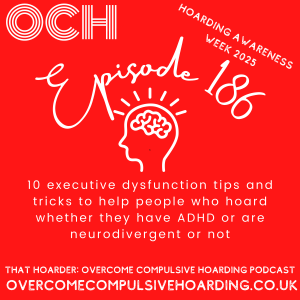
Friday May 16, 2025
#186 10 executive dysfunction tips and tricks to help people who hoard, whether we have ADHD or are neurodivergent or not - Hoarding Awareness Week 2025
- Come to a Dehoarding Accountability Zoom Session: http://www.overcomecompulsivehoarding.co.uk/ticket
- Subscribe to the podcast: https://www.overcomecompulsivehoarding.co.uk/subscribe
- Podcast show notes, links and transcript: http://www.overcomecompulsivehoarding.co.uk/
For Hoarding Awareness Week 2025, I’m focusing on executive function - the brain’s control centre for planning, starting, and finishing tasks - and the small, practical hacks that can make a genuine difference for people who hoard, whether or not we have ADHD or are neurodivergent. I talk about real-life tips for breaking the overwhelm, managing perfectionism, building momentum, and overcoming shame, all with the aim of making progress sustainable and achievable in your day-to-day life. This episode is all about honest advice that actually works, whether you’re in the thick of it or just looking for a few smarter ways to approach this.
- Hoarding Awareness Week 2025 and its theme: Hoarding & Executive Function
- Recognition that executive function challenges impact both neurodivergent and neurotypical people
- Executive Function and Hoarding
- Previous podcast episodes relating to executive function, ADHD, and hoarding
- Importance of using effective hacks and techniques, regardless of neurotype
- Emphasis on finding what works personally for each listener
- The Realities and Challenges of Tackling Hoarding
- Overwhelm and daunting feelings about dehoarding
- Breaking tasks into small, manageable parts
- Focus on actionable, day-to-day strategies rather than long-term, rigid planning
- Understanding Executive Function
- Explanation of what executive function is (control centre for planning, focus, and impulse control)
- Factors that can impair executive function (neurodivergence, mental health, stress, lack of sleep, etc.)
- Universality of executive dysfunction - everyone struggles at times
- Emotional Barriers: Perfectionism and Shame
- The cycle of shame and self-blame in executive dysfunction and hoarding
- Societal judgment around hoarding, and its paralysing effects
- Strategies for stepping back, naming emotions, and cultivating self-compassion
- Core Executive Dysfunction Tips and Hacks
- Breaking Tasks Down
- Setting realistic micro-goals
- The concept of “towards” vs. “away” moves in progress
- Tracking Progress
- Counting bags/items leaving the house
- Caution against tracking becoming burdensome for some
- Using Timers
- Setting short (e.g., 5-minute) timers to help with task initiation
- Use of voice assistants to avoid distraction
- Reverse-timer technique to use end of music/podcast as a cue for action
- The Two-Minute Rule
- Limitations and personal adaptations of rule
- Identifying Motivations
- Creating visual or written reminders of why you want to dehoard
- Acceptance of some tools working only temporarily, and switching when necessary
- Reward Systems
- Small, non-material rewards for completing tasks
- Linking listening to desired media (like the podcast) with decluttering activities
- Non-Negotiable Rules
- Creating routines to reduce decision fatigue (e.g., charity bags leave home immediately)
- Body Doubling
- Doing tasks alongside others (physically or virtually, like in the host’s Zoom sessions)
- Emotional/moral support of parallel accountability
- Alternative ways to body double if group support isn’t accessible
- Time Blocking and Scheduling
- Using calendars and reminders to schedule decluttering sessions
- Flexibly adapting this strategy based on personal response
- Habit Stacking
- Linking a new task to an established routine (e.g., unloading dishwasher while kettle boils)
- Using “add-ons” for frequently-visited spaces (e.g., clearing five things each time you enter the bathroom)
Links
- Podcast ep 183: ADHD, executive dysfunction and creating hacks and systems to reduce clutter chaos, with Carrie Lagerstedt
- Podcast ep 162: From Fibble to Focus: Defibble your executive dysfunction with Jo Cavalot
- Podcast ep 112: Executive function, executive dysfunction and hoarding with Dr Jan Eppingstall
- Podcast ep 149: ADHD, hoarding and clutter with Susie Boutal, ADHD and Declutter Coach
- Podcast ep 107: Things that look like hoarding but aren’t: ADHD, depression, autism, OCD, OCPD and more
- Podcast ep 40: ADHD and hoarding with Dr Sharon Morein
- Podcast ep 82: Dehoarding when you’re drowning with KC Davis of Struggle Care
- Podcast ep 182: What are “towards and away moves” and what on earth do they have to do with hoarding recovery? With Dr Jan Eppingstall
- Podcast ep 184: What if we actually felt the feelings? An honest conversation about trauma, hoarding, and allowing yourself to feel
- Podcast ep 28: Avoid analysis paralysis by having ‘systems’
- Arielle and Ned's Daily Tips That May or May Not Help You
- Come to a Dehoarding Accountability Zoom session: Accountability Booking Form
- Website: Overcome Compulsive Hoarding
- Become a Dehoarding Darling
- Submit a topic for the podcast to cover
- Questions to ask when dehoarding: https://www.overcomecompulsivehoarding.co.uk/podquestions
- Instagram: @thathoarderpodcast
- Twitter: @ThatHoarder
- Mastodon: @ThatHoarder@mastodon.online
- TikTok: @thathoarderpodcast
- Facebook: Overcome Compulsive Hoarding with That Hoarder
- Pinterest: That Hoarder
- YouTube: Overcome Compulsive Hoarding with That Hoarder
- Reddit: Overcome Compulsive Hoarding with That Hoarder subreddit
- Help out: Support this project
- Sponsor the podcast
Subscribe to the podcast
No comments yet. Be the first to say something!